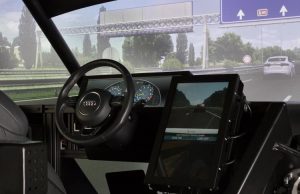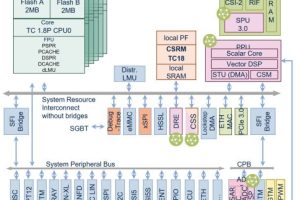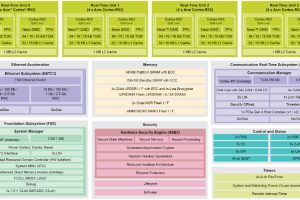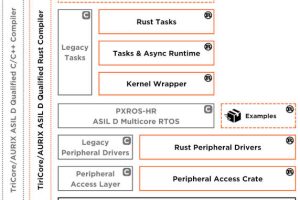 As an example, Cruden installed a driver simulator merged with a dSPACE HIL set-up at the Ostfalia University of Applied Sciences in Germany, where students can integrate hardware into the driving simulator.
As an example, Cruden installed a driver simulator merged with a dSPACE HIL set-up at the Ostfalia University of Applied Sciences in Germany, where students can integrate hardware into the driving simulator.
HIL set-ups, for testing sensors, controllers and actuators for example, often rely on synthetic or pre-recorded input signals that lack the typical closed loop behaviour of a human driver.
DIL simulators on the other hand include that interactive driver but may have imprecise models of the actual hardware, because specific components are either too complex to simulate in full detail or controllers have many unknowns, coming as black boxes from suppliers.
Cruden’s approach is to combine its Panthera simulator software with hardware interfacing capabilities of dSPACE hard real-time (HRT) systems and the open and real-time-capable dSPACE ASM (Automotive Simulation Models) simulation tool suite.
The Panthera ePhyse HRT toolbox includes a Simulink block set optimised for use on the dSPACE system. It is an integrated solution to set-up IO between the dSPACE platform and the simulator environment.
Martijn de Mooij, technical development manager at Cruden, writes:
“We have worked hard on the usability of this system. We haven’t proverbially duct-taped the motion system to the dSPACE box, we have ensured seamless integration throughout the entire system. Before, companies would have to buy a simulator and then buy an off- the-shelf dSPACE system and integrate the two themselves. We’ve done all that hard work for them, to provide a complete functional set-up that works out straight of the box.”
The only hardware change required is the replacement of the conventional Windows-based computer (which sends output to the motion, audio and visual systems) in the soft real-time (SRT) set-up with a dSPACE system.
The package is also able to integrate peripheral hardware, such as instruments or other HMI equipment, over standard available interfaces like CAN.
 Electronics Weekly Electronics Design & Components Tech News
Electronics Weekly Electronics Design & Components Tech News


